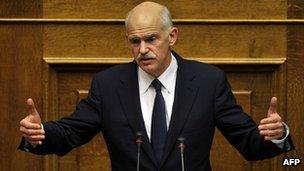Where did it all go wrong for Papandreou?
- Published
- comments

Panadreou's international background went from being an asset to a liability
ATHENS - As the hours tick by before Friday night's confidence vote in the Greek government, there is a growing consensus that the country's prime minister will have to step down.
George Papandreou, 59, once embodied the hopes of the country's elite, combining a Western education with membership of a political dynasty that has ruled this country for three generations.
Now the opposition will not enter a caretaker government if Mr Papandreou stays. Furthermore his own Socialist party contains enough dissenters that he can probably only marshal complete support from its members if he can convince them that he is on the way out.
So it appears that either he will fall tonight, or he will survive for a short time while a coalition is formed that can approve the European Union bail out.
Many Greeks lampoon Mr Papandreou as either incompetent or corrupt. He is painted by critics as a man who fell sadly short of the qualities required to follow in his grandfather and father's footsteps as a successful prime minister.
Popular rumour has it that he was forced into the job by his ambitious (American) mother, who wanted to see one of her sons continue the family political tradition.
As for outsiders, Mr Papandreou's fate should be a warning to us about highly educated politicians who speak perfect English and therefore appear to be people the international community "can do business with".
During his family's long exile, Mr Papandreou went to school in Canada and University at Amherst College in the United States, as a result of which many suggest he can express himself more eloquently in English than Greek.
For a time his otherness, something that supposedly included his absorption of the protestant work ethic during his long odyssey abroad, appealed to some Greeks, people who wanted the country dragged out of its somnolent Mediterranean ways.
Now though, it is backfired against him, and the accusation is muttered, "he's not a real Greek".
Why did it all go so wrong? Miranda Xafa, a former IMF economist, argues, "he chose the wrong people, they made very little difference".
Perhaps he got caught between the devil - in the form of ministerial appointments from a party base that owed his family loyalty - and the deep blue sea in apparently being too ready to agree to such hard, internationally mandated austerity measures.
Whatever the building causes of his failure, the immediate trigger was his decision a few days ago to call a referendum on the EU's bail out package, agreed last week in Brussels. It produced such an angry reaction from France and Germany, threatening Greece's future participation in the euro, that the political class here was traumatised and Mr Papandreou's credibility as the best man to talk to the international community evaporated.
With this loss of credibility, the prime minister's ability to maintain his slender majority faltered. The opposition meanwhile has refused to offer any lifeline that involves Mr Papandreou remaining in power.
In an attempt to bolster his national political credentials, Mr Papandreou attempted his ill-fated quest to gain support for painful austerity measures through a national vote.
Europe's big players and the EU institutions took their revenge. The lessons, in terms of the power that they - principally Germany - now wield should be clear, and this country will have to find someone better able to sell bitter foreign medicine to its electorate.